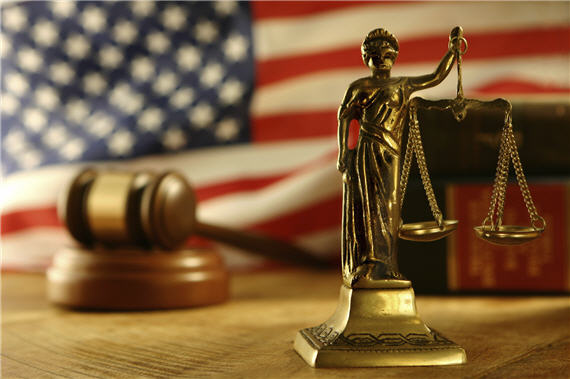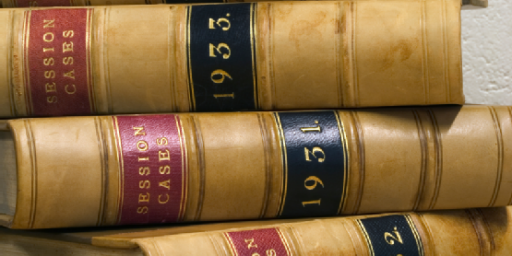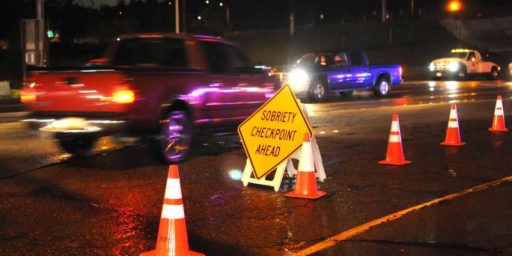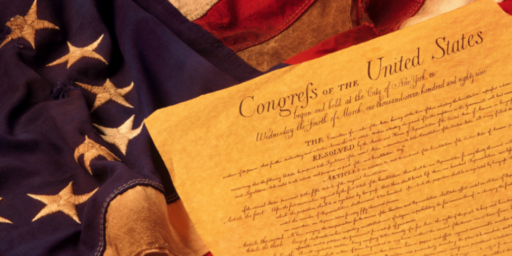Supreme Court: Strip Searches Always Permissible
The US Supreme Court ruled today that police can strip search anyone they decide to arrest for anything for any reason.
The US Supreme Court ruled today that police can strip search anyone they decide to arrest for anything for any reason.
NYT (“Justices Approve Strip-Searches for Any Offense“):
The Supreme Court on Monday ruled by a 5-to-4 vote that officials may strip-search people arrested for any offense, however minor, before admitting them to jails even if the officials have no reason to suspect the presence of contraband.
Justice Anthony M. Kennedy, joined by the court’s conservative wing, wrote that courts are in no position to second-guess the judgments of correctional officials who must consider not only the possibility of smuggled weapons and drugs but also public health and information about gang affiliations. About 13 million people are admitted each year to the nation’s jails, Justice Kennedy wrote. Under Monday’s ruling, he wrote, “every detainee who will be admitted to the general population may be required to undergo a close visual inspection while undressed.”
Justice Stephen G. Breyer, writing for the four dissenters, said strip-searches were “a serious affront to human dignity and to individual privacy” and should be used only when there was good reason to do so.
[…]
The Supreme Court case arose from the arrest of Albert W. Florence in New Jersey in 2005. Mr. Florence was in the passenger seat of his BMW when a state trooper pulled his wife, April, over for speeding. A records search revealed an outstanding warrant based on an unpaid fine. (The information was wrong; the fine had been paid.)
Mr. Florence was held for a week in jails in two counties, and he was strip-searched twice. There is some dispute about the details but general agreement that he was made to stand naked in front of a guard who required him to move intimate parts of his body. The guards did not touch him.
This is just appalling.
The 4th Amendment declares that “The right of the people to be secure in their persons, houses, papers, and effects, against unreasonable searches and seizures, shall not be violated, and no warrants shall issue, but upon probable cause, supported by oath or affirmation, and particularly describing the place to be searched, and the persons or things to be seized.” How is a strip search under the conditions of Florence’s arrest–for a crime that had no relation to violence or hiding of small objects–reasonable? In what sense is there probable cause? When was a warrant issued? What particular thing were they looking to seize?
Radley Balko observes that “these decisions are continually undermined by the fact that only two justices on the current Court have any criminal law experience, and none have any experience in criminal defense. (The last Supreme Court justice who did any criminal defense work was Thurgood Marshall, who retired more than 20 years ago.)”
Lyle Denniston offers the small comfort that,
Some difference of emphasis among the five Justices in the majority made it appear that the decision might be more limited than at first glance.
The ruling, it appeared, did not authorize jail officials to conduct a strip search unless the prisoner was to be placed among other prisoners at the facility. Two Justices wrote separately in an effort to stress that aspect of the ruling, and their votes were essential to the 5-4 result.
The decision was a clear defeat for challengers to strip searches as a general policy. The Court explicitly refused to limit the authority to use strip searches only to situations in which a specific individual gave officers a reason to consider that prisoner to be dangerous or likely to be carrying a concealed weapon or drugs. The same kind of visual inspection of an arrestee’s naked body, the Court declared, can be applied to anyone placed in the general population of a jail or prison, even if only temporarily.
Additionally, he points out that the NYT description elides some not insignificant information.
As if somehow to help justify its ruling against his challenge to the strip searches, the Court’s main opinion by Justice Anthony M. Kennedy opened with a description of Florence’s earlier run-in with police, seven years before the arrest that led to the strip searches. He had been arrested after fleeing from police, and was charged with obstruction of justice and use of a deadly weapon. He had pleaded guilty to less serious offenses, had paid part of the fine, but had fallen behind in his payments. That, and a failure to appear at a court hearing about the fine, led to the issuance of an arrest warrant. He had paid the remainder of the fine a week later, but the warrant remained open in computer files.
Although the Kennedy opinion would later say that police need not make a strip search policy depend upon an arrested individual’s prior history in crime, the inclusion of the background material about Florence’s history appeared to be aimed at showing that police could not know the character of any individual they had brought in, and thus needed a policy applying to all to ensure that no threat would enter the facility with that prisoner.
The main opinion noted that the jail officials involved in this case had asked the Court not to write constitutional rules that would require them to forgo a strip search unless they had reason to do so based on an individual’s behavior, the suspected crime for which that person been arrested, the person’s criminal record, or “other factors.” Justice Kennedy wrote: “They offer significant reasons why the Constitution must not prevent them from conducting the same search on any suspected offender who will be admitted to the general population of their facilities.”
But that’s circular reasoning, at best. At most, this demonstrates that Florence was more of a threat than one would suspect from the circumstances of his arrest. On the one hand, the obvious counter is that the police had no reason to suspect that. On the other hand, that’s sort of Kennedy’s point: it’s conceivable that some seemingly innocent Schmoe arrested for, say, failing to pay his parking tickets could in fact have a weapon.
To buy that argument, though, is to make a mockery of the Constitution’s requirement of probable cause. Indeed, it turns it on its head: If it’s even remotely conceivable that someone has a weapon, he should be treated as if he is.







Unbelievable. By this logic courts are in no position to determine the validity of probable cause or a myriad other potential abuses by police. In fact taken to its conclusion, the possibility of drugs or weapons justifies virtually anything the police do.
From MSNBC’s article on it:
Umwhat? How would strip searching Tim McVeigh have stopped him? And are they suggesting that the police should strip search speeders because it will prevent terrorism?
Our culture of security theater has reached full on insanity.
You have the right to remain silent baby, and we suggest you use it…
Sigh.
This is wonderful. How many young girls have been strip-searched inappropriately by police and now our SCOTUS has given them full license. This has to be the worst SCOTUS in the history of our nation.
I’m laughing because as I read this there are ads appearing alongside offering the opportunity to link up with pneumatic Russian females.
All right, that’s it. My “almost” alcoholic days are over.
Is it juvenile of me to suddenly want to join the police force and request assigment to the nieghborhood where Jennifer Aniston lives?
Of course it is.
I don’t care.
This is highly unreasonable. Another nail in the 4th Amendment’s coffin. Sad day for America.
@Janis Gore:
Hah, I was thinking the same thing in relation to the latest war with Iran? thread.
@Rob in CT: Cheers, hon.
All joking aside…
As Jeffrey Toobin wrote elsewhere today:
This Court’s desire to make policy as in this case…everyone shall be treated as a threat…instead of their intended purpose of interpreting law, is in direct conflict with those powers.
Can someone explain to me how this ruling is big C Conservative?
Or is it, as I believe, just another example of the Conservative Movement losing it’s way. They used to abhor activist judges…now they are activist judges.
When the Conservative Justices decide to act as a Supreme Congress rather than a Supreme Court our system will not function as intended in the Constitution. Sort of ironic from a political party that wets itself over original intent.
The potential for abuse in this decision is staggering.
This should make life interesting for criminal defense attorneys, no?
George III’s mausoleum must be cracking with laughter. Freedom!
And the silence form the right is deafening.
Limited Government my ass.
This is just the Corrections side of the LEO mentality that believes in tasing/shooting first and asking questions later. Thanks, War on Drugs!
The hysterical reactions of the media and academe-based chattering classes certainly are predictable, but no less are they faulty and overblown.
The underlying procedural context of that case was a Sec. 1983 lawsuit for money damages. The primary issue was whether the Fourth Amendment requires state and local correctional officials to exempt certain detainees and prospective detainees from standard strip search protocols at the facilities over which they have dominion. The High Court said no, the Fourth Amendment does not require such exemptions. Ergo a summary judgment against the Petitioner’s Sec. 1983 claim was upheld.
That’s what happened here.
The Court didn’t say that strip searches always are permissible in all circumstance. The Court said nothing of the sort. Not even close. The entire thesis of this hysterical blog is erroneous. Again, the Court said that the Fourth Amendment does not require state and local correctional officials to exempt certain detainees and prospective detainees from standard strip search protocols at jail facilities.
State constitutions can be to the contrary. State laws can prescribe otherwise. Even at the local level it would be permissible to have contrary policies, i.e., those with exemptions or those which entirely proscribe strip searches. Or not. That’s the whole point. That’s what the Court held. It’s up to state and local lawmakers and rulesmakers to make these decisions. The very essence of federalism, no?
As I often said back when I blogged: Read it again, you missed the point.
Once powers such as these are ceded, there is virtually no way to ever get them back. If it was JUST a strip search… but it must be added to the same culture which brought us torture, renditions, the Patriot Act, the DHS, indefinite detention/assassination, all of which are actual threats to American freedom. And now they want nukes on drones, what could possibly go wrong?
Welcome to our Police State, please wipe your feet on our Constitution, and undress. We need to make sure you are, in fact, human.
And yet being required to have health insurance is seen as horribly unconstitutional…
I think TN2 actually wrote something that is correct. I checked and it’s April 2, so this isn’t some sort of elaborate hoax. Weird.
Summing up in a pithy description, the Robert’s court is one that will find that a police state is constitutional and at the same time that government can not take any action that generally benefits the citizenry if it impedes minutely on an individual.
@An Interested Party: “And yet being required to have health insurance is seen as horribly unconstitutional…:
Apples and oranges, and mighty weak tea.
Health care is no threat to your freedom. We all pay, one way or another. When you pay a dollar for a service, even one you do not like, typically, no one dies. No one is tortured. No one is secreted away. No one is detained indefinitely. No one marches into war without Congressional declaration of same. No one launches illegal drone attacks, coming soon to a police department near you. The military wants them tipped with nukes.
Your priorities appear to be horribly out of order.
Add in no-knock entry, the militarization of police forces, cameras, cameras, everywhere, police drones, shooting the family dog on sight, harassing citizens for using their cameras in a legal manner…
Does the Bill of Rights not exist? Anyone have some ideas to ratchet down the “security” apparatus?
Now that Illinois Lt. Gov. Sheila Simon wants to collect a government tax of $5 per Strip Club patron I have already advocated she must extend this levy to women who attend bachlorette parties featuring the Chipendales or similar male entertainers.
Of course now she will have to assess a fee on the jailers who conduct these searches too!
http://thesouthern.com/news/local/simon-pushes-stripper-tax/article_4d525364-7aeb-11e1-b3bc-0019bb2963f4.html
The US Supreme Court just threw out any restraints on search and siezure: no warrant needed according to any reading of this latest ruling. Another deletion from the Bill of Rights.
This decision, coupled with Citizens United and the upcoming ACA decision will serve to underscore the importance of the November election. A vote for the Republican ticket is a vote for the future nomination of justices like Scalia, Roberts, Alito and Thomas to the Supreme Court.
As many have said, “elections have consequences.”
@James in LA: Actually, the point I was making is that many of the same justices who voted for this monstrosity also seem to feel like being required to have health insurance is somehow horribly unconstitutional…you should address your comments to them rather than to me…
Just the latest example of The US of A’s march toward the police state they used to warn us about when I was growing up in the 50s. Your papers please! We are rapidly becoming our cold war enemy.
The history of our country has had its ebbs and flows…often mistakes like this one are corrected over time…the question is when will that happen to this particular ruling…
If Newt had his way it wouldn’t take very long…
“I’m fed up with elitist judges” who seek to impose their “radically un-American” views, Gingrich said
“The courts have become grotesquely dictatorial and far too powerful,” he said
When asked if Congress could enforce the subpoena by sending the Capitol Police to arrest a judge, Gingrich assented.
“If you had to,” Gingrich said. “Or you’d instruct the Justice Department to send the U.S. Marshall.”
Does anyone think that the judges really wanted to be responsible for trying to tell jailers how to operate their jails in such a way that the jailers do not have to strip search most people but does not create a huge hole in their security.
Maybe the judges learned their lesson after telling California that it could segregate inmates based upon race.
My impression is that this court will strike down precedent in order to insure the government cannot create laws restraining corporations, and will strike down precedent to insure the government CAN create laws infringing on individuals.
Free strip searches? sign me up. Another sad development in our criminal justice system
I agree that standards to be able to strip search someone should be high, although the TSA is basically doing that now which I don’t agree with. The safety argument should only work so far and IMO we have gone too far in use of that argument. It is a tough line to define though.
Although from what I heard is this decision isn’t what many try to make it out to be. The case is to be sent back down to the lower courts for further litigation and will likely in back up at the Supreme Court.